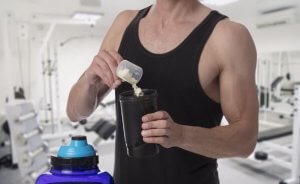Three Essential Supplements for Your Physical Development

High physical exertion exercises require dietary supplements that complement the daily diet. The supplements are recommended according to the specific needs of each gymnast. There is a group of three fundamental supplements that are essential for good physical development.
Essential supplements for muscle growth
Professional athletes create their own personalized formulas so that the body is able to acquire muscle mass. Although many suggest that with a healthy and balanced diet supplements aren’t necessary. However, it’s always convenient to include some essential nutrients, especially when training.
Creatine
Creatine promotes fast muscle recovery. This component acts even during training, and between sets. It’s recommended for athletes who want to increase the volume of muscle mass.
Among the reasons why athletes who perform strength exercises use creatine is the high scientific endorsement that it has. In this sense, it’s considered to be one of the essential supplements for physical development.

The way to ingest this supplement is generally by means of daily capsules, with a typical dose of five grams. In a natural way, the body absorbs creatine through meat and fish.
Our bodies obtain creatine through amino acids in the kidney and liver such as methionine, arginine, and glycine. Because it’s an essential element in the energy production process, this active principle tops the list of supplements in the world of fitness.
In scientific terms, it’s a nitrogenous organic acid. It’s estimated that, in 3.53 ounces of red meat, the body is nourished with 0.02 ounces of creatine. In the case of physical exhaustion by athletic training, the amount of creatine that the body demands are three to six ounces. That is to say, that an athlete should eat at least 2.20 pounds of meat every time he trains.
Studies have shown that, in cases of high-intensity exercise, creatine supplements are advisable. Anaerobic gymnastics with weights has one of the greatest demands for creatine supplements. On the other hand, the consumption of these supplements for the diet doesn’t produce adverse effects.
Vitamin D
Another of the fundamental supplements for good physical development for athletes is vitamin D. In this case, the vitamin is responsible for the absorption of phosphorus and calcium. A body with satisfactory levels of this element will possess strong bones and a lower risk of osteoporosis.
Vitamin D also helps to increase muscle strength, power and good function at a basic level. In turn, another benefit is its antioxidant capacity, since it helps to neutralize free radicals. These benefits also act on the neurological system, favoring brain health.
For the body to have this vitamin, it must ingest the so-called precursors, such as vegetables and animal derivatives. However, it’s through exposure to ultraviolet radiation that vitamin D is activated naturally.
Keep in mind that, in cold climates, during the winter season and with little sunlight, it’s often necessary to supplement the diet with vitamin D supplements.
Omega-3
While it provides great benefits to the body, professional athletes choose omega-3 as one of their essential supplements to care for bone health. These acids also actively collaborate in the good arterial functioning; among other things, because they control triglycerides that clog the arteries.

The benefits of omega-3 also include anti-inflammatory and regenerative powers. The omega-3, unlike the omega-6, isn’t always present in the traditional diet. One way to incorporate this supplement is by ingesting fish oil, or by nutritional supplementation.
How and when to opt for supplements
Each body takes more or less time to experience muscle growth through physical training. Sometimes, it may take one or two years to reach the ideal muscular figure. The most impatient athletes choose the fast path of steroids, although adverse effects mean that the price they pay for going easy is very high.
While a proper and balanced diet is key to good muscle development. Sometimes it’s advisable to consult a nutritionist to recommend adequate proportions and, if necessary, those essential supplements to gain muscle without losing health.
High physical exertion exercises require dietary supplements that complement the daily diet. The supplements are recommended according to the specific needs of each gymnast. There is a group of three fundamental supplements that are essential for good physical development.
Essential supplements for muscle growth
Professional athletes create their own personalized formulas so that the body is able to acquire muscle mass. Although many suggest that with a healthy and balanced diet supplements aren’t necessary. However, it’s always convenient to include some essential nutrients, especially when training.
Creatine
Creatine promotes fast muscle recovery. This component acts even during training, and between sets. It’s recommended for athletes who want to increase the volume of muscle mass.
Among the reasons why athletes who perform strength exercises use creatine is the high scientific endorsement that it has. In this sense, it’s considered to be one of the essential supplements for physical development.

The way to ingest this supplement is generally by means of daily capsules, with a typical dose of five grams. In a natural way, the body absorbs creatine through meat and fish.
Our bodies obtain creatine through amino acids in the kidney and liver such as methionine, arginine, and glycine. Because it’s an essential element in the energy production process, this active principle tops the list of supplements in the world of fitness.
In scientific terms, it’s a nitrogenous organic acid. It’s estimated that, in 3.53 ounces of red meat, the body is nourished with 0.02 ounces of creatine. In the case of physical exhaustion by athletic training, the amount of creatine that the body demands are three to six ounces. That is to say, that an athlete should eat at least 2.20 pounds of meat every time he trains.
Studies have shown that, in cases of high-intensity exercise, creatine supplements are advisable. Anaerobic gymnastics with weights has one of the greatest demands for creatine supplements. On the other hand, the consumption of these supplements for the diet doesn’t produce adverse effects.
Vitamin D
Another of the fundamental supplements for good physical development for athletes is vitamin D. In this case, the vitamin is responsible for the absorption of phosphorus and calcium. A body with satisfactory levels of this element will possess strong bones and a lower risk of osteoporosis.
Vitamin D also helps to increase muscle strength, power and good function at a basic level. In turn, another benefit is its antioxidant capacity, since it helps to neutralize free radicals. These benefits also act on the neurological system, favoring brain health.
For the body to have this vitamin, it must ingest the so-called precursors, such as vegetables and animal derivatives. However, it’s through exposure to ultraviolet radiation that vitamin D is activated naturally.
Keep in mind that, in cold climates, during the winter season and with little sunlight, it’s often necessary to supplement the diet with vitamin D supplements.
Omega-3
While it provides great benefits to the body, professional athletes choose omega-3 as one of their essential supplements to care for bone health. These acids also actively collaborate in the good arterial functioning; among other things, because they control triglycerides that clog the arteries.

The benefits of omega-3 also include anti-inflammatory and regenerative powers. The omega-3, unlike the omega-6, isn’t always present in the traditional diet. One way to incorporate this supplement is by ingesting fish oil, or by nutritional supplementation.
How and when to opt for supplements
Each body takes more or less time to experience muscle growth through physical training. Sometimes, it may take one or two years to reach the ideal muscular figure. The most impatient athletes choose the fast path of steroids, although adverse effects mean that the price they pay for going easy is very high.
While a proper and balanced diet is key to good muscle development. Sometimes it’s advisable to consult a nutritionist to recommend adequate proportions and, if necessary, those essential supplements to gain muscle without losing health.
This text is provided for informational purposes only and does not replace consultation with a professional. If in doubt, consult your specialist.








